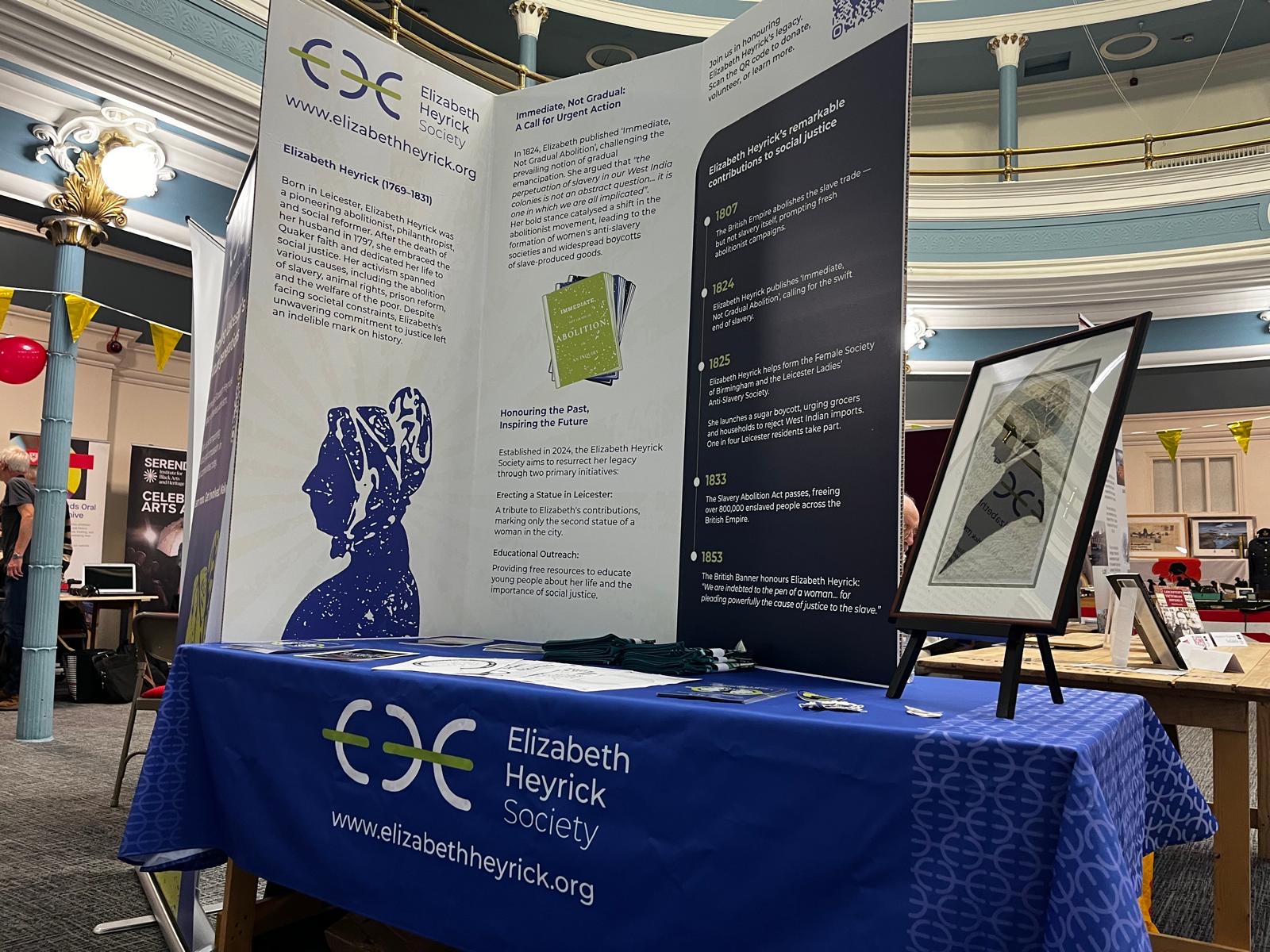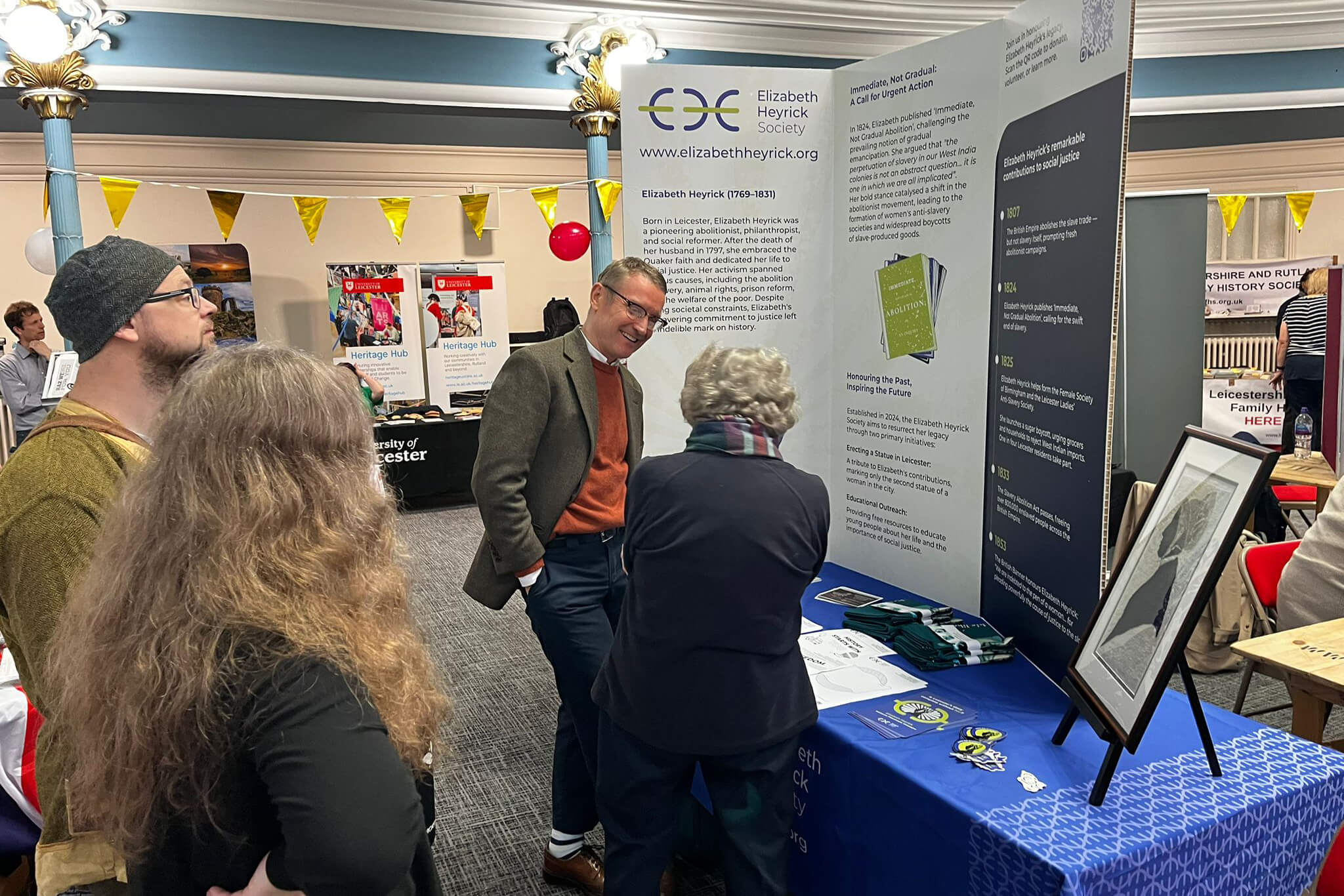Elizabeth Heyrick: philanthropist and abolitionist
Discover the life and contributions of Elizabeth Heyrick, a 19th-century pioneer for change.




Elizabeth Heyrick's name is not widely familiar, yet she played a decisive role in one of the great campaigns in 19th-century Britain: the abolition of slavery within the British Empire in 1833. She organised consumer boycotts of slave-produced goods and wrote powerful polemics to influence those in Parliament and beyond.
As a woman, Elizabeth Heyrick was denied the right to vote but worked through the power of popular pressure. Despite her many ground-breaking achievements, her memory has been neglected; there are no monuments, and few people from her home city of Leicester in England would know her name. In what follows, we will explore the story of one of Leicester's forgotten heroines.

Early life
Elizabeth Heyrick (1769-1831) was born in Leicester to John Coltman (1727-1808), a hosiery manufacturer and Elizabeth Cartwright (1737-1811), a book reviewer and poet. Her parents were dissenters and part of a community of like-minded reformers who actively engaged in discussions about social and political issues of the time.
A reforming spirit
In 1789, she married John Heyrick (1762-1797) who trained as a lawyer but then instead took a commission in the 15th Light Dragoons. However, Elizabeth was widowed only eight years later in 1797. Following John Heyrick's death, she became a Quaker and dedicated her life to various social reform efforts, sustained by the support and company of a group of like-minded talented women. She wrote over 20 pamphlets advocating for a range of causes including better working conditions and living wages for factory workers, animal welfare, prison and political reform, and an end to corporal punishment. Elizabeth is perhaps best known for the crucial role she played in the 19th-century abolitionist movement.

Trading in slaves within the British Empire was abolished in 1807, but the institution of slavery remained and was the focus of renewed campaigning. Heyrick's most notable contribution to the anti-slavery movement was her influential pamphlet titled Immediate, not Gradual Abolition. Published in 1824, the pamphlet argued for the immediate and unconditional emancipation of slaves, challenging the prevailing notion of gradual emancipation.
Heyrick believed that the gradual approach was insufficient and that a more radical and immediate stance was necessary to address the moral and ethical issues surrounding slavery. Her uncompromising stance drew both support and criticism within the abolitionist circles, but it left a lasting mark on the movement and led to the British campaign deciding on an immediate approach. Despite facing criticism from leading figures such as William Wilberforce (1759-1833) and Thomas Clarkson (1760-1846), Heyrick remained steadfast in her commitment to the cause.
“Mrs Heyrick was the highly respected, talented and uncompromising friend of liberty…”
Several editions of Immediate, not Gradual Abolition were published in the United States during the 1830s and helped influence the campaigns of prominent abolitionists such as Frederick Douglass (1818-1895), William Lloyd Garrison (1805-1879) and Lucretia Mott (1793-1880). Generally, pamphlets were published anonymously, but American publishers chose to use Heyrick's name and added a preface suggesting the pamphlet had been a huge advantage in the British abolition campaigns, particularly in urging the switch from a gradual phasing out to an immediate abolition. It is clear the pamphlet resonated with William Lloyd Garrison; in 1833, during a public speech in Glasgow, he singled out Heyrick’s contribution: “Who first gave the world the doctrine of immediate emancipation? It was a woman in England - Elizabeth Heyrick… Mrs Heyrick was the highly respected, talented and uncompromising friend of liberty…”
From words to action
Beyond her writings, Heyrick engaged in practical efforts to promote immediate abolition. She was a founding member of the Female Society of Birmingham in 1825, the first anti-slavery society for women in the world. Heyrick was instrumental in forming the Leicester Ladies’ Anti-Slavery Society, alongside Susannah Watts (1768-1842). An earlier consumer boycott of sugar products as part of the anti-slave trade campaign was revived. In Leicester, Elizabeth personally distributed literature and organised a sugar boycott urging grocers not to stock West Indian imports, and by 1825, roughly twenty-five percent of the city's population had stopped buying West Indian sugar.

“When there is no longer a market for the productions of slave labor, then, and not till then, will the sacrifice be emancipated.”
Elizabeth Heyrick passed away on 18 October 1831, leaving behind a lasting impact on the fight against slavery. Her efforts contributed to the growing momentum of the abolitionist movement in the United Kingdom and the United States and laid the groundwork for future activists and leaders who would eventually see the abolition of slavery in the British Empire in 1833. Her story provides a crucial example for future generations, showing that, with ambition and determination, an individual can change the world for the better.
Elizabeth as philanthropist and animal rights campaigner
After being widowed at a young age, Elizabeth emerged from mourning, determined to secure the improvement and welfare of all her fellow creatures, especially the neglected and oppressed. Despite parental opposition she set up a boarding school in Leicester, modelling it upon Quaker schools which she had visited. She also found time for numerous charitable works, visiting the local prisons where she was moved by the many cases of hardship which she encountered. In the prisons she found many who had been convicted for petty crimes but were unable to obtain release because of their inability to pay their ‘gaol fees’. Elizabeth made representations to the magistrates and eventually paid many such fees in order to liberate the sufferers.
Elizabeth first rose to public prominence, however, when, by chance, she visited the Derbyshire village of Bonsall, near Matlock, on the occasion of their annual wake where she was horrified to learn that the inhabitants were preparing for a bull-baiting. Having failed to persuade anyone to intervene and stop the cruelty, she eventually halted proceedings by buying the bull and leading it off to safety despite ‘the rage and disappointment of the assembled spectators’. Pamphlets on the subject soon followed and with the help of the local curate the practice of bull-baiting in Bonsall and at Uppingham was eventually brought to an end. Her concern for animal welfare was to be again exhibited in a further pamphlet which highlighted the cruelties suffered by animals sold at Smithfield Market in London.
Pamphlets were to follow on subjects as diverse as the sufferings of the framework knitters, prison reform and vagrancy legislation. Although it is rightly Elizabeth’s writings concerning the evils of the slave trade which historians now recall, the compassion and sensitivity which she displayed for all living creatures is still as relevant today as when she first wrote on the subject. There is still much that we can learn from her words.
“Unsuccessful opposition to crimes of every description invariably increases their power and malignity.”
Elizabeth Heyrick's remarkable contributions to social justice
Elizabeth Heyrick, a 19th-century philanthropist and abolitionist, dedicated her life to combating slavery and promoting social justice. Her tireless efforts and unwavering commitment continue to inspire generations.
Unleash the Heyrick in you
Embrace your power to shape a world of equality and justice. Support our campaign to create a lasting memorial that inspires future generations.
Stay informed
Get the latest news and updates from the Elizabeth Heyrick Society.

Elizabeth Heyrick is a hero whose actions transcend her time. She embraced all people as being equal in their human capabilities. She participated in all the progressive causes: fighting the scourge of slavery by articulating the rationale for Immediate Abolition, calling out the selfishness of the wealthy, and defending the rights of animals. Her strong, independent, passionate voice as a woman created new pathways to freedom. I treasure her as one of the best heroes we have from that time.”

Elizabeth Heyrick (1769-1831), anti-slavery campaigner and philanthropist. Her anti-slavery works included appeals directed to British women and ‘not to the Government, but to the People of England’. The best known is Immediate, not gradual abolition, or, An inquiry into the shortest, safest, and most effectual means of getting rid of West Indian slavery (1824), a pamphlet which broached the idea of speedy abolition while William Wilberforce and other male leaders were still gradualist. It sold hundreds of thousands of copies in Britain and the USA. There seems to be no likeness of her, but a memorial in Leicester, her birthplace, would seem appropriate.”
_(cropped).jpg)
Elizabeth Heyrick was one of the most admirable activists in British history. She spoke out at a time when women were supposed to keep quiet. Her sense of justice was deep and unswerving. Her unceasing advocacy of freedom for British slaves sparked the formation of dozens of women’s antislavery societies. And these, in turn, by their demands for immediate emancipation, highlighted the timidity of more cautious male abolitionists. I applaud this new effort to celebrate Heyrick and make her remarkable work better known. We need her like in the world today.”

Elizabeth Heyrick was an extraordinary woman. Her powerful and influential 1824 pamphlet, Immediate not Gradual Abolition, made the case for the immediate abolition of slavery at a time when most campaigners were arguing for an abolition process that would have taken decades to end slavery. She should be much better known.”






